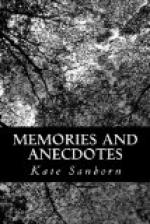He calmly replied that “it could be said to be either inside or outside potentiality, as we might say of potatoes in a hat; they are either inside or outside the hat.” That seemed to satisfy her perfectly.
Mr. Frank B. Sanborn read his lecture on American Literature, and I ventured to ask: “How would you define literature?”
He said: “Anything written that gives permanent pleasure.” And then as he was a relative, I inquired, but probably was rather pert: “Would a bank check, if it were large enough, be literature?” which was generally considered as painfully trifling.
Jones of Jacksonville was on the program, and talked and talked, but as I could not catch one idea, I cannot report.
It was awfully hot on that hill with the sun shining down through the pine roof, so I thought one day enough.
As I walked down the hill, I heard a man who seemed to have a lot of hasty pudding in his mouth, say in answer to a question from the lady with him: “Why, if you can’t understand that, you can have no idea of the first principles (this with an emphatic gesture) of the Hegelian philosophy.”
Alcott struck me as a happy dreamer. He said to me joyously: “I’m going West in Lou’s chariot,” and of course with funds provided by his daughter.
An article written by her, entitled “Transcendental Wild Oats,” made a great impression on my mind.
It appeared in a long-ago Independent and I tried in vain to find it last winter. Houghton and Mifflin have recently published Bronson Alcott’s “Fruitlands,” compiled by Clara Endicott Sears, with “Transcendental Wild Oats” by Louisa M. Alcott, so it is brought to the notice of those who will appreciate it.
I called once on Miss Hosmer, who then was living with relatives in Watertown, Massachusetts, her old home; the house where she was born and where she did her first modelling. Recently reading in Miss Whiting’s record of Kate Field’s life, of Miss Hosmer as a universal favourite in Rome, a dearly loved friend of the Brownings, and associated with the literary and artistic coterie there, a living part of that memorable group, most of whom are gone, I longed to look in her eyes, to shake her hand, to listen to her conversation. Everyone knows of her achievements as a sculptor.
After waiting a few minutes, into the room tripped a merry-faced, bright-eyed little lady, all animation and cordiality as she said: “It is your fault that I am a little slow in coming down, for I was engrossed in one of your own books, too much interested to remember to dress.”




